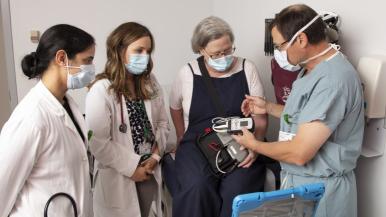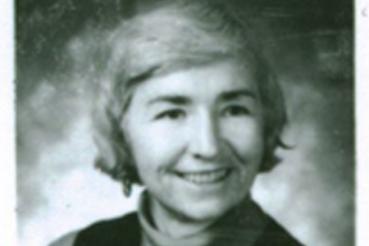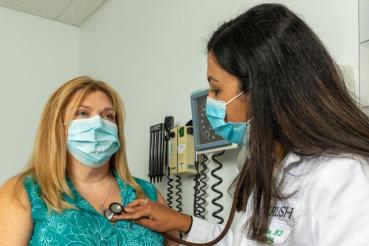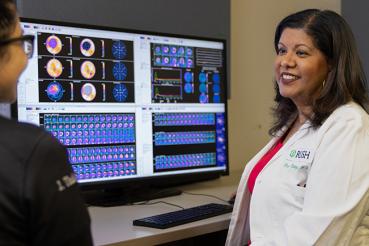A heart failure diagnosis changes your perspective and your world, and you may even begin to lose hope. But the heart failure care team at RUSH isn’t just offering hope. It also offers precious time to patients facing potentially life-threatening heart problems.
According to the Centers for Medicare and Medicaid Services, RUSH University Medical Center has the highest survival rates for heart failure patients in the United States. Becker’s Hospital Review recently reported these outcomes, showing that RUSH is tied for No. 1.
The care team that achieved these results includes more than just cardiologists. It’s also made up of nurses, pharmacists, social workers, patient coordinators and advanced practice providers. They all work together to make sure patients get the personalized treatment they need.
How do they give patients such promising outcomes? And what does it mean for you if you’re a heart failure patient? It takes a full team effort with specialists in many fields, all working together with the latest techniques to give each patient the custom treatment and outcomes they need.
Experts with the latest tools and therapies
The heart failure care team at RUSH has a long history of excellent care for patients. They’ve earned both a spot on the American Heart Association’s Honor Roll and their Gold Plus status for heart failure treatment.
“We take care of all stages of heart failure, from prevention to advanced disease,” says Tisha Suboc, MD, a RUSH cardiologist. “We can help patients prevent heart failure and treat them when they need additional support.”
That ongoing, expert care is backed up by all the latest tools and equipment for diagnosing, monitoring and treating heart conditions.
“CardioMEMS is one device that helps us monitor patients’ fluid status so they can feel better and hopefully stay out of the hospital,” says Karolina Marinescu, MD, a RUSH cardiologist who specializes in advanced heart failure. “And our utilization of all guideline-directed medical therapy far exceeds that of the majority of other hospitals.”
“RUSH’s investment in modern medical technology and state-of-the-art facilities enables us to provide advanced diagnostic tools and innovative treatment options,” Suboc says. “This allows for more accurate diagnoses and better management of heart failure, reducing the risks for patients.”
In fact, through research and clinical trials, RUSH actually helps develop many of the treatments that heart patients need. And by being on the forefront, they can offer patients care that they may not find anywhere else.
“This access to cutting-edge research and potential new therapies positively impacts patient outcomes and helps maintain a high survival rate,” Suboc says.
A whole team working for you at every step
When you come to RUSH for heart failure care, you don’t just get expert treatment from cardiologists. You also have a team of patient navigators and coordinators who take care of scheduling appointments, answer insurance questions and make sure you know what to expect. They help you get the care you need quickly and easily.
“We are fortunate in that we have dedicated staff to help our patients coordinate their appointments and testing,” Marinescu says. “And the results are available before patients come see us in the clinic. So whatever other procedures they may need and whatever medication adjustments need to be made, we can make those on a weekly or even daily basis.”
The care team even goes beyond RUSH, including referring physicians so you can continue to see your regular doctors.
“When we have referrals, we personally will contact the referring provider,” Suboc says. “It's collaborative. We're not here to take over their patient. We work with them, to improve their patients' outcomes and health.”
“While we look for advanced therapy options, the patient is still able to continue to see their referring provider,” says Kerry Shanklin, NP, a RUSH family nurse practitioner in the clinical area of cardiology. “We do a partnership, a shared care type of approach.”
Heart failure patients also tend to need help with medications. That’s why pharmacists are included in the process.
“We have dedicated heart failure pharmacists who make sure that we get patients on medications and review for interactions,” Marinescu says. “So we not only get patients on the appropriate medical therapy, but we also avoid medication errors, which can be a huge source of patient health problems.”
A patient-centered approach
Heart failure care isn’t just about treating existing problems. It also involves preventive care and educating patients so they can feel empowered and involved in their own treatment. That’s especially important for those who may feel that they’ve lost control over their health following a serious diagnosis.
“The team emphasizes preventive care and patient education programs, raising awareness about heart failure symptoms, risk factors and lifestyle modifications,” Suboc says. “By helping patients understand and manage their conditions, we can take proactive steps to minimize complications and improve outcomes.”
The team treats each patient as an individual with their own unique needs. Each care plan is customized and collaborative.
“We have multidisciplinary conferences where a large community of specialists will get together and collaborate to individualize the treatment plan for each patient,” Marinescu says.
That patient-centered approach continues even after a patient undergoes a procedure. Follow-up care is very important for making sure they stay healthy once they leave the medical center.
“Ensuring patients receive comprehensive post-discharge instructions, regular check-ups and medication management can help prevent relapses, reduce readmission rates and improve long-term outcomes,” Suboc says.
If you need care for heart failure, testing for heart conditions or a second opinion on your diagnosis, call RUSH at (888) 352-7874 or visit our page on scheduling your appointment for online options.




